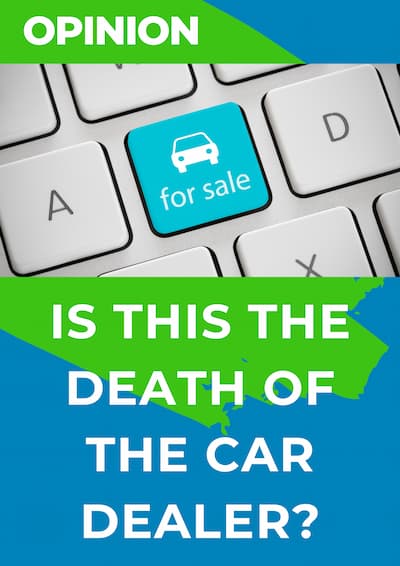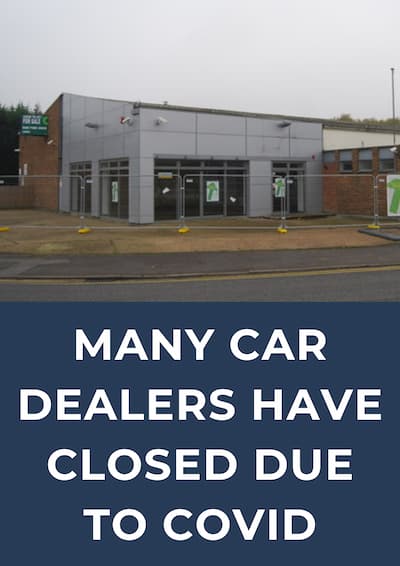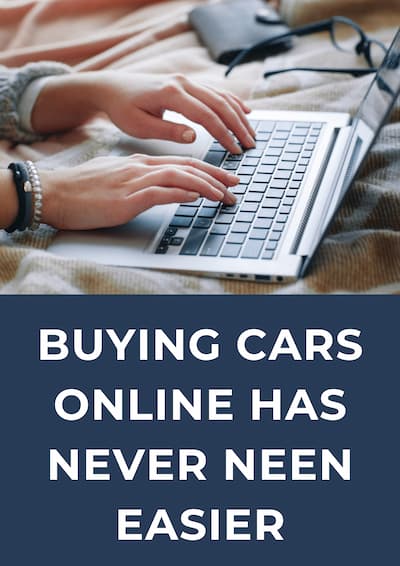Call Monday-Friday 9am - 6pm Closed Saturday & Sunday



[ Contact Us ]
Need Help? Calling from a mobile please call 0151 647 7556
0800 195 4926Do you have a question? or need help?
Call Monday-Friday 9am - 6pm Closed Saturday & Sunday,

Before the car buying restrictions, car sales were a pretty simple process. Researching your next car purchase is straightforward online, but the actual purchase was usually made by a trip to the motor dealer showroom. The 'touch and feel' and 'face to face' interaction with the car dealer seemed to provide the environment to provide the confidence to complete the deal.
But car buying restrictions in place because of Covid-19 have made car dealers rethink how they do business. One of their strategies is embracing technology and different car buying platforms.
During the initial lockdown phase of the pandemic, motor dealers had to quickly adapt to completing the entire sale of a vehicle online, with either home delivery or a 'click and collect' to follow.
With a few clicks on your mobile phone, tablet or computer, you can now browse through hundreds of car models from car dealership websites around the country without ever having to get out of your chair. That's good news for the car dealer, who used to depend on car showroom traffic for most of their business and could only show a few dozen cars at any given time before it became difficult to find them among the other vehicles on display.
With car buying restrictions in place, car dealers needed to rethink how they do business. Online car platforms allow car dealers to reach new car buyers and tap into pre-owned car buyers who traditionally haven't visited a car dealer showroom.
Online car platforms are easy to use, too – there's no pressure, car buying restrictions mean there's more time to make a decision online. Car dealers can also provide car buyers with personal service through instant messaging or phone calls.
But will this be enough? Car dealer showroom traffic has fallen dramatically due to Covid-19. It's too early to tell if car dealers can successfully survive or perhaps evolve.
As the potential for car showrooms to return to how they worked before, the question is, will they?
Will people want to go back to going to your local dealership to buy their next car, or are they happy to complete the whole process online?
The question is will car showrooms become a thing of the past?
Will they survive, or will they find themselves on the path towards extinction?
Let's explore these questions, and more, in detail here:
This is an interesting question that may not have a clear answer. By having to compare new car deals online, may ensure fully considered buying decisions were made.
The car buying restrictions might have had an additional impact in preventing car buyers from being pushed into a car sale they didn't want by car dealer sales staff. Still, it doesn't mean car buyers have ultimately become afraid of the motor dealers.
Touching and feeling the car they want to buy, having a test drive and speaking to car dealer staff are all part of the car buying process.
Shopping for car deals online can provide car buyers with more time to consider their options, but it doesn't mean they don't want the reassurance and confidence a car showroom visit gives them.
 Will car dealers get rid of physical car showrooms altogether?
Will car dealers get rid of physical car showrooms altogether?
There is little doubt that many car dealer groups have rationalised their showroom networks in response to the pandemic. Motor dealer showrooms are expensive places to run. Having a dealership open for vanity or just about break-even is not an attractive option anymore.
To maximise car sales, car dealers may decide to get rid of car showrooms altogether and look at how the car buying process can be changed.
For example, car buyers can have a test drive at home using a 'click and collect service that doesn't involve leaving your doorstep at all. This will give car buyers the car buying reassurances they've come to expect without having to step foot into a car showroom.
A car buyer could even have their car delivered directly to their home or workplace if they wanted, and all it would take is for dealers to rethink how car buying works.
There is also a possibility that motor dealer sites could change to service and test drive centres. Cars will still need servicing, of course.
And speaking of car dealers changing the car buying process, car sites that give online car deals could also become more critical.
As car buyers return to car dealer showroom traffic, will they trust car dealership websites as much as other car sites?
The reason is simple a car salesperson's car purchasing advice is always going to be biased. Car dealers may convince car buyers that their car is the best deal, even though it might not be.
Car sites that don't have a vested interest in selling any car are likely to do better in this environment because car buyers will feel they can trust car buying advice more.
We have seen many motor dealer sites close in the last year, especially those with close 'sister' sites that can pick up the slack.
If the motor dealers stop physically selling cars on-site, they will still provide servicing facilities for their customers.
Finally, people will still like to test drive cars, perhaps multiple vehicles. The showrooms may cease being a place you can buy a car, but you could still go to test drive models in which you are interested.
Buying cars online will be quicker than car dealer showroom sales, and car buyers won't have to travel back and forth from work or home before buying. But could it become a more costly or time consuming process?
Online car buying car sites will need to take care of dealers' car prices as a starting point and add their commission. Or perhaps they charge the dealer per lead. Either way, this is a cost that needs to be factored in.
This will mean car buyers have more options, but they could also spend longer finding the right car deals online from car sites that show all car prices... so if car buyers want to save time, they might want to avoid specific car dealer car sites altogether.
Indeed, sound filter systems will be beneficial. Still, there could be a vested interest for the car dealership website to show as many deals from different dealers as possible if they run on a pay per impression basis with the dealers.
Some car websites also charge dealers to show their adverts in 'premium' positions. Do not assume that the first few deals you see are necessarily the best ones you can get.
One aspect of all the deals being shown online is that the price differences between offers will be apparent. Cheaper deals will most likely attract more clicks.

When car buying restrictions were in place, car buyers had to complete the car buying process online. Now that those restrictions are easing, some people might want to visit their local dealership for reassurances, but many will be happy with the car purchasing process from home.
How many? Well, time will tell, but there is no doubt some former 'showroom' buying customers will be lost to the new online option forever.
There was always an argument that one part of the sales process that would fall down on an online sale would be the area of a part exchange vehicle. However, dealers have adapted to not seeing the car physically and can give a price subject to viewing the car.
There are further options that mean you could end up getting more for your part exchange than the dealer can give you. Online car buying websites have access to many routes to selling your car. These can sometimes result in you getting a higher price from them for your part ex.
Many new car purchases will involve the buyer using finance to complete the purchase. In the past, signing finance documents could only take place in the car dealer. Not anymore. Dealer arranged finance is now available for 'e-sign' online.
Motor dealer showrooms are expensive places to run. Typically in prime retail positions, they carry hefty rent and rates bills. Then you have to staff your department, again adding to the overall costs.
Running an online business will also come with some high costs, including online advertising and running web facilities. However, you may well be able to run the business on lower staff levels.
Changing a business from a locally based showroom model to a nationwide online model can open new doors. However, whilst you can do more volume, you also might find the margins squeezed.
So there is an argument that even if by moving online, you only run at 75% of the income you had before, if your running costs are 50% of what they were, then you are much more profitable.
If you can make more money running without a physical showroom, many dealers will be tempted to do it.
Ultimately, this is the question. There will be some shift from showroom to online, but how much may determine the long term prospects of physical motor dealer sites.
What will you do when you are changing your car next? Will you be confident enough to complete the process online, or will you be heading back to your local showroom?